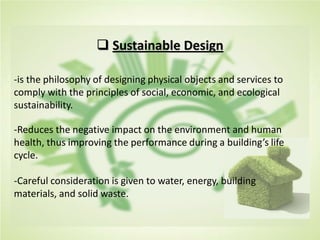The Role Of Civil Engineering In Developing Sustainable Educational Infrastructure

As the world is becoming more and more aware of the importance of sustainability, civil engineering is emerging as one of the key professions in achieving a sustainable future. The Civil Engineering profession plays a critical role in creating a sustainable environment and infrastructure for future generations to enjoy. Civil Engineers are responsible for the design, construction, and maintenance of the built environment, which includes buildings, roads, bridges, waterways, and other infrastructure systems. In this post, we will take a closer look at the role of Civil Engineering in Sustainable Development.
What is Sustainable Development?
Sustainable Development refers to the ability to meet the needs of the present generation without compromising the ability of future generations to meet their own needs. It is the idea of creating a world that is socially, economically, and environmentally sustainable. The United Nations has defined Sustainable Development as development that meets the needs of the present without compromising the ability of future generations to meet their own needs.
The Role of Civil Engineering in Sustainable Development
Civil Engineering plays a crucial role in Sustainable Development. Civil Engineers design, construct, and maintain the built environment that provides the foundation for economic and social growth. They ensure that the infrastructure is built in such a way that it meets the needs of the present without compromising the ability of future generations to meet their own needs.
The Civil Engineering profession encompasses a wide range of specialties, including structural engineering, transportation engineering, environmental engineering, water resources engineering, and geotechnical engineering. Each of these specialties plays a critical role in creating a sustainable future.
Structural Engineering
Structural Engineers design structures that are strong, safe, and sustainable. They ensure that buildings, bridges, and other infrastructure systems can withstand the forces of nature and the demands of modern society. Structural Engineers use advanced materials and techniques to create structures that are environmentally friendly and energy efficient.
Transportation Engineering
Transportation Engineers are responsible for the design, construction, and operation of transportation systems, including highways, airports, and public transportation systems. They work to create safe, efficient, and sustainable transportation systems that meet the needs of both present and future generations.
Environmental Engineering
Environmental Engineers work to protect the environment and promote sustainability. They design and implement solutions to environmental problems, such as air and water pollution, waste management, and renewable energy systems. Their work helps to ensure that the natural environment is protected and preserved for future generations.
Water Resources Engineering
Water Resources Engineers design and implement solutions to water-related issues, such as flood control, water supply, and water treatment. They work to ensure that water resources are managed in a sustainable and environmentally friendly way.
Geotechnical Engineering
Geotechnical Engineers ensure that infrastructure systems are built on a stable foundation. They use advanced techniques to study the properties of soil and rock and design infrastructure systems that can withstand the forces of nature.
FAQ
What is the importance of Sustainable Development?
Sustainable Development is important because it ensures that the needs of the present are met without compromising the ability of future generations to meet their own needs. It provides a framework for creating a world that is socially, economically, and environmentally sustainable.
How does Civil Engineering contribute to Sustainable Development?
Civil Engineering contributes to Sustainable Development by designing, constructing, and maintaining the built environment that provides the foundation for economic and social growth. Civil Engineers ensure that the infrastructure is built in such a way that it meets the needs of the present without compromising the ability of future generations to meet their own needs.
What are some examples of sustainable infrastructure?
Examples of sustainable infrastructure include buildings that are energy efficient, transportation systems that reduce greenhouse gas emissions, and water treatment systems that use renewable energy sources.
What is the role of Government in promoting Sustainable Development?
The Government plays a critical role in promoting Sustainable Development. Government policies and regulations can create incentives for businesses and individuals to adopt sustainable practices. The Government can also invest in sustainable infrastructure and technologies and promote public awareness of the importance of sustainability.
What is the future of Sustainable Development?
The future of Sustainable Development is bright. As more and more people become aware of the importance of sustainability, there will be a growing demand for sustainable infrastructure and technologies. Civil Engineers will play a critical role in meeting this demand and creating a sustainable future for generations to come.
Conclusion
Civil Engineering is a critical profession in achieving a sustainable future. Civil Engineers are responsible for the design, construction, and maintenance of the built environment, which provides the foundation for economic and social growth. The Civil Engineering profession encompasses a wide range of specialties, including structural engineering, transportation engineering, environmental engineering, water resources engineering, and geotechnical engineering. Each of these specialties plays a critical role in creating a sustainable future. As the world becomes more and more aware of the importance of sustainability, the demand for sustainable infrastructure and technologies will continue to grow, and Civil Engineers will be at the forefront of meeting this demand.


Post a Comment for "The Role Of Civil Engineering In Developing Sustainable Educational Infrastructure"